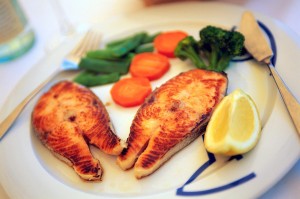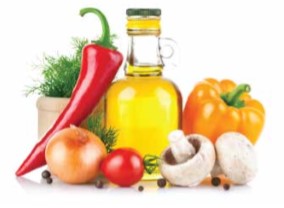UNDERSTANDING DIETARY FATS & YOUR HEALTH
Dietary fats and oils may well be the most important part of your daily diet. There is a great deal of information available which links fat with many of the most common forms of degenerative disease afflicting society today, including cancer and heart disease.
But it is fundamental to realize that not all fats are created equal. Simply put, there are actually good fats and bad fats, fats that support beneficial body processes and fats that lead to negative effects. Becoming familiar with those different types of fats and oils will help you make informed health enhancing decisions.
In order to understand the subject we need to start with some definitions. When we speak of fats we refer to both fats and oils. The difference between them is that fats are solid at room temperature, whereas oils are liquid. Dietary fats are available primarily from two basic sources: animal and vegetable.
Animal fats tend to be solid and vegetable fats tend to be liquid. There are three primary fat types: saturated fats, monounsaturated fats and polyunsaturated fats. Foods generally contain a mixture of these different fats but one is usually predominate.
Fats are the major constituent of every cell membrane in the body
Without strong membranes foreign invading organisms such as viruses and bacteria may pass into cells and destroy them. These fats located in the cell membrane also produce extremely important products called prostaglandin’s. Prostaglandin’s are hormone like substances that regulate every function in the body at the molecular level.
Over the past ten years a tremendous amount of research has been conducted on the role of different prostaglandin’s and their impact on health and disease. It appears that certain prostaglandin’s, derived from natural unprocessed polyunsaturated fats have extremely important and beneficial effects for the body. Unfortunately, these polyunsaturated fatty acids (PUFAs) are very easily deactivated.
The main processes which alter them is heat, oxygenation and hydrogenation. Heating happens whenever the oil is heated as in cooking or processing.
Oxygenation, a more subtle process, occurs when the oil is exposed to air and light such as when oils sit on grocery shelves.
Essential fatty acids are thought of much like vitamins or minerals, substances with the body must have to perform vital functions. Hydrogenation occurs when hydrogen is bubbled through PUFAs as in the making of margarine.
Through these processes these beneficial polyunsaturates go through two detrimental processes. First, they can release what are called free radicals, highly reactive molecular fragments that react with other cells causing death and degeneration.
Premature aging, heart disease, cancer and other degenerative processes are the result of unbridled free radical activity.
Second, the beneficial natural PUFAs actually change their molecular configuration or shape, forming what are termed trans fatty acids (TFAs). These TFAs are biochemically different and are not able to fulfill the same function as the original pure PUFA.
Unfortunately they can still take the place of the biochemically active PUFAs in cell membranes, acting to slow the production of the beneficial prostaglandin’s. There is also some evidence to suggest that they may act like free radicals and promote tissue destruction. In summary, PUFAs are actually very beneficial nutrients that must be consumed for proper health maintenance. It is only when these fats are altered that they become ‘good fats gone bad’.
So what do you cook with? That’s where monounsaturates come in. Monounsaturated oils, such as olive or canola oil, are much more biochemically stable and are much less susceptible to biochemical change upon heating or exposure to air. We recommend that most cooking needs should be done with monounsaturetes.
What about saturated fats?
Saturated fats are also very stable and resistant to change. However, they tend to inhibit the production of those beneficial prostaglandin’s as well as form some other prostaglandin’s that are not beneficial. Saturated fat consumption seems to be related to serum cholesterol levels which in turn is related to heart disease. The main problem with saturated fats is really related to the fact that people eat too much of them.
Our recommendations are as follows:
- Keep total fat consumption to approximately 20-25% of total caloric consumption. Remember, fats have lots of calories, twice as many as either protein or carbohydrates by weight. Most Americans get between 30-40% of their calories from fat. Fast food, fried food, desserts, dairy and red meat all have high amounts of fat in them.
- Polyunsaturated fats as oil, safflower, sunflower and corn oil as examples, should be bought fresh and in an unprocessed state as possible. Most oils sitting on grocery shelves have been heat extracted, releasing free radicals and producing TFAs. Look for cold pressed oils, often found in health food stores. Keep your oils sealed in the refrigerator to cut down on free radical generation. Additionally, adding an opened capsule of vitamin E to the bottle helps cut down further on free radicals. Polyunsaturated oil is very beneficial but only in its natural unaltered state.
- Cook only with monounsaturated oils. The best to use is virgin olive oil.
- Keep saturated fat consumption to a minimum: butter, dairy and red meats are the main saturated fats. This doesn’t mean none, but it probably means less then what you are eating. There are also a lot of hidden saturated fats in commercially prepared foods. Be aware and educate yourself.
- Avoid all trans fatty acids. These include margarine and most fried fast foods. TFAs are probably the worst kind of fat you can eat. Stay away from them.
- Certain diseases can be addressed in part through the manipulation of different fats and oils in the diet. The biochemical rationale and recommendations differ with each disease and is beyond the scope of this paper. Please consult your physician for nutritional supplementation in this area.
BASIC FAT GROUPS
Saturated Fats:
Animal sources: pork lamb and beef fats, organ meats, dairy products such as milk, cheese, ice cream and butter
Vegetable sources: coconut oil, cocoa butter, palm oil, and palm-kernel oil, found in commercially prepared baked goods, pie fillings, non-dairy cream substitutes and fast-food preparations.
Monounsaturates:
Vegetable sources: olive, avocado, peanut and canola oils
Polyunsaturates:
Animal sources: mothers milk, organ meats, lean meats and fish, particularly salmon, herring, trout, cod and tuna
Vegetable sources: linseed, flaxseed, soybeans, walnuts, corn, sunflower, safflower, sesame, cottonseed oils and leafy green vegetables.
Contact 970-889-3541 to find out more about how Dr. Brown can help improve your health with wellness seminars and services.

